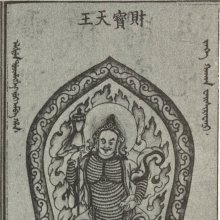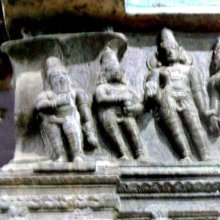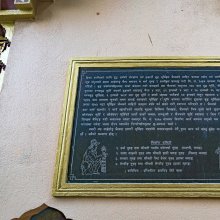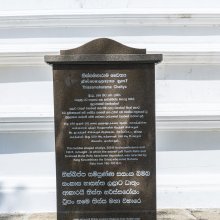Maharaja, Mahārāja, Maha-rajan, Maharajan, Mahārājan, Maha-raja: 25 definitions
Introduction:
Maharaja means something in Buddhism, Pali, Hinduism, Sanskrit, the history of ancient India, Marathi, Hindi. If you want to know the exact meaning, history, etymology or English translation of this term then check out the descriptions on this page. Add your comment or reference to a book if you want to contribute to this summary article.
Maharaja has 24 English definitions available.
Alternative spellings of this word include Maharaj.
Images (photo gallery)
(+1 more images available)
Languages of India and abroad
Sanskrit dictionary
[Deutsch Wörterbuch]
Source: Cologne Digital Sanskrit Dictionaries: Böhtlingk and Roth Grosses Petersburger WörterbuchMahārāja (महाराज):—[(ma + rāja)] m. [Vopadeva’s Grammatik 6, 37.]
1) ein grosser König, - Fürst d. i. ein regierender Fürst, Landesherr [Aitareyabrāhmaṇa 7, 34.] [The Śatapathabrāhmaṇa 1, 6, 4, 21. 2, 5, 4, 9. 14, 5, 1, 19. fg.] [Śāṅkhāyana’s Brāhmaṇa 5, 5.] [MAITRYUP. 2, 1.] [Pāṇini’s acht Bücher 4, 2, 35. 3, 97.] [Mahābhārata 1, 531. 3, 2129. 2304. 2324. 2448. 2725. 6, 426. 7, 7657.] [Rāmāyaṇa 1, 17, 31. 70, 16. 2, 45, 10. 52, 31.] [Śākuntala 80, 21. fg. 100, 15.] [Vikramorvaśī 37, 9.] [Kathāsaritsāgara 71, 239.] [Spr. 214. 4705.] [Varāhamihira’s Bṛhajjātaka S. 86, 2] (mahārājādhirājaka) . [Mārkāṇḍeyapurāṇa 123, 6.] [Vetālapañcaviṃśati] in [Lassen’s Anthologie (II) 2, 14.] [ŚUK. ebend. 37, 1.] [Hiouen-Thsang 1, 250.] in einer Inschr. [Lassen’s Indische Alterthumskunde 2, 942,] [Nalopākhyāna 5.] Varuṇa [GOBH. 4, 7, 25.] Kubera [Taittirīyāraṇyaka 1, 31, 6.] Viṣṇu [Bhāgavatapurāṇa 5, 19, 3.] mahābhāṣyamahārājasūktiratnākara d. i. die dem grossen Fürsten Mahābhāṣya (Patañjali’s Werk) gehörige Edelsteingrube Sūkti (Titel des Commentars) [Weber’s Verzeichniss No. 721.] —
2) bei den Buddhisten bilden die vier Grosskönige mit ihrem Gefolge (s. caturmahārājakāyika) eine best. Klasse göttlicher Wesen [Burnouf 603.] [Lot. de Lassen’s Anthologie b. l. 3. 845.] [WASSILJEW 170. 198.] [Lebensbeschreibung Śākyamuni’s 258 (28).] [KÖPPEN 1, 250. 526. 2, 261. 296, 299.] —
3) Beiname Mañjuśrī's [Trikāṇḍaśeṣa 1, 1, 21.] —
4) Name der Nachkommen des Sectenstifters Vallabhācārya; vgl. History of the Sect of Maharayas u. s. w. London [1865.] —
5) Fingernagel [Hemacandra’s Abhidhānacintāmaṇi 594.] — Vgl. māhārājika .
Source: Cologne Digital Sanskrit Dictionaries: Sanskrit-Wörterbuch in kürzerer FassungMahārāja (महाराज):—m. —
1) ein grosser König , — Fürst , ein regierender Fürst , Landesherr. —
2) eine best. Gottheit [Maitrāyaṇi 2,9,1] (hier ein Name des Mondes ). [Mānavagṛhyasūtra 2,14] ( rājan 1). [Āpastamba’s Dharmasūtra] auch Beiname Kubera’s und Viṣṇu's. —
3) Pl. eine best. Klasse göttlicher Wesen bei den Buddhisten. —
4) *ein Gina [Galano's Wörterbuch] —
5) *Beiname Mañjuśrt's. —
6) Bez. der Nachkommen des Sectenstifters Vallabhākārya. —
7) *Fingernagel.
Sanskrit, also spelled संस्कृतम् (saṃskṛtam), is an ancient language of India commonly seen as the grandmother of the Indo-European language family (even English!). Closely allied with Prakrit and Pali, Sanskrit is more exhaustive in both grammar and terms and has the most extensive collection of literature in the world, greatly surpassing its sister-languages Greek and Latin.
See also (Relevant definitions)
Partial matches: Maha, Rajan, Raja.
Starts with (+18): Maharaja shyamasah shankara, Maharaja-bappa-svamin, Maharaja-mata, Maharaja-pitamahi, Maharaja-prayojana, Maharaja-saheb, Maharajachuta, Maharajacuta, Maharajadhi, Maharajadhiraja, Maharajadhiraja-parameshvari, Maharajadhiraja-pati, Maharajadruma, Maharajaghara, Maharajaka, Maharajakayika, Maharajakula, Maharajakulina, Maharajakumara, Maharajalilasana.
Ends with: Adhimaharaja, Badamaharaja, Balimaharaja, Bharatamaharaja, Brahma-maharaja, Caturmaharaja, Cetakanripamaharaja, Dharma-maharaja, Dharma-yuvamaharaja, Hariharamaharaja, Janabrahmamaharaja, Kamadeva maharaja, Tissamaharaja, Uparika-maharaja, Vadya-maharaja, Yuvamaharaja.
Full-text (+378): Maharajika, Maharajacuta, Maharajadhiraja, Kubera, Maharaja-saheb, Maharajanighantu, Maharajamishra, Maharajakulina, Maharajadruma, Maharajaphala, Shivacandra, Maharajangana, Hariharamaharaja, Cudeshvara, Shyamasahshamkara, Caturmaharaja, Uparika-maharaja, Arare, Virocana, Khuddakaraja.
Relevant text
Search found 135 books and stories containing Maharaja, Mahārāja, Mahā-rāja, Maha-rajan, Mahārājā, Maharajan, Mahārājan, Maha-raja, Maharāja, Mahā-rājan; (plurals include: Maharajas, Mahārājas, rājas, rajans, Mahārājās, Maharajans, Mahārājans, rajas, Maharājas, rājans). You can also click to the full overview containing English textual excerpts. Below are direct links for the most relevant articles:
The Way of the White Clouds (by Anāgarika Lāma Govinda)
Chapter 23 - Miraculous Escape and Floating Lights < [Part 2 - Pilgrim Life]
Chapter 21 - Healing Powers < [Part 2 - Pilgrim Life]
Chapter 22 - The Hermit Abbot of Lachen < [Part 2 - Pilgrim Life]
The history of Andhra country (1000 AD - 1500 AD) (by Yashoda Devi)
Introduction (Vaidumba dynasty) < [Chapter XVII - The Vaidumbas]
Part 2 - Balliya chola (A.D. 950) < [Chapter XX - The Telugu Cholas (Chodas)]
Part 15 - Bettarasa A.D. (1121-1125) < [Chapter XX - The Telugu Cholas (Chodas)]
Annadatri-carita (study) (by Sarannya V.)
2. Annadatri-Carita (classification and subject-matter) < [Chapter 3 - An Introduction to Annadatri-carita]
4. Political Dimensions in Annadatri-carita < [Chapter 5 - Annadatri-carita—A Critical Study]
Bhagavati-sutra (Viyaha-pannatti) (by K. C. Lalwani)
Chapter 7: Lokapāla Somadeva < [Book 3]
Chapter 1-4: Lokapālas of Īśānendra < [Book 4]
Chapter 5-8: Capital-cities of Lokapālas < [Book 4]
Sanskrit sources of Kerala history (by Suma Parappattoli)
6.3. Kesavadasa Prasasti < [Chapter 2 - Historical details from Mahatmyas and Prashastis]
10. The Vancidravilasa of Sankara Subrahmania Sastri < [Chapter 3 - Historical Details from Mahakavyas]
Other works dealing with the history and culture of Kerala < [Chapter 2 - Historical details from Mahatmyas and Prashastis]
Impact of Vedic Culture on Society (by Kaushik Acharya)
Mingling of Cultures (H): The Mudgalas of Dakṣiṇa Toṣāla < [Chapter 4]
Provincial and District Administration < [Chapter 5]
System of Taxation < [Chapter 5]
Related products









